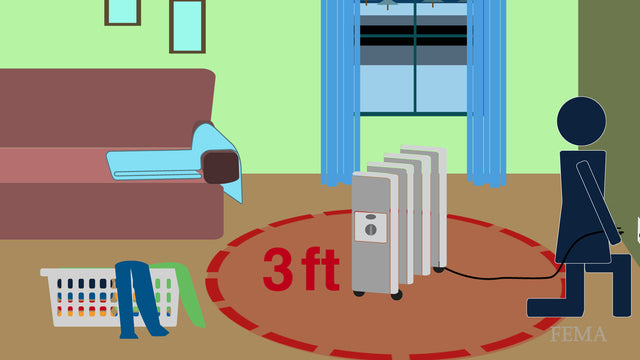Blizzards, ice storms, and high winds often cause power outages just when warmth and light are needed the most in our homes. If by chance you have a wood-burning stove or fireplace with a supply of dry firewood, you’re ahead of the game. However, if your home doesn’t have one, how do you keep warm when the utilities go out?
Portable Heaters to the Rescue
Most people turn to propane-powered space heaters. These can put out enough heat to warm an area large enough to fit your family during the power outage—even if that may result in a little more “togetherness” than your gang normally prefers! (Pretend you’re camping out.)
When shopping for a space heater, look for safety features such as an automatic tip-over turn-off switch and a low-oxygen sensor. These features will shut off the heater if it tips over or shut off the propane if the oxygen level in the air dips too low. Remember that you need sufficient ventilation of fresh air in the room, even if it’s cold!
Of course, you’ll need to keep a supply of propane bottles or tanks on hand to use with these heaters. Most of them will accommodate either 1-lb. or 20-lb. propane tanks and come with the appropriate adapters and connectors.
Here at Emergency Essentials, we recommend the Mr. Heater brand. All three models include the above-mentioned safety features:
-
Mr. Heater Big Buddy Combo (our price $160.95, which includes the heater, a fuel filter, and a five foot hose adapter. All you need is the propane, which you must buy in your area. This heater is certified by the CSA International (American Gas Association) for both indoor and outdoor use, and can heat up to 400 square feet for up to 220 hours on the low setting. It features an internal, battery-operated blower fan.
-
Mr. Heater Portable Buddy (our price, $115.95) can heat up to 200 square feet and uses either the 1-lb. or 20-lb. propane tanks.
-
Mr. Heater Little Buddy (our price, $63.95) can heat up to 100 square feet. Works with only a 1lb. propane tank.
One customer told us that his family was without power for three weeks after Hurricane Sandy. When the nights turned frigid, their Mr. Buddy Heater was (literally!) a lifesaver.
Portable Heater Safety
Safety is always a concern with any portable heater. FEMA reports that an estimated 900 portable heater fires in residential buildings are reported each year, causing 70 deaths, 150 injuries, and $53 million in property loss. (Estimates from the Consumer Protection Agency are actually much higher.)
January and February are the peak months for these fires, which are usually caused by the heater being placed too close to flammable items (bedding, drapes, clothing, tablecloths, rugs, sleeping bags, trash cans, stacks of papers or magazines, etc.).
How can you keep from having a safety issue with your heater? FEMA has produced a 30-second
video on heater safety; it’s definitely worth your time to watch it.

A Few Portable Heater Safety Tips:
- Use the proper size heater for the area you need to heat. Expecting a small heater to warm a large area can result in the unit overheating. Using too large a heater in a small area can increase the amount of carbon monoxide in the air.
- Keep the area sufficiently ventilated with fresh air.
- Follow your heater’s instructions exactly.
- Use appropriate connectors, hoses, etc. for your model.
- Keep heaters at least three feet from anything that can burn.
- Don’t leave your heater unattended.
- Place heater on a hard, level, non-flammable surface (not on a rug or carpet).
- Inspect your heater regularly for damage, and don’t use a defective unit.
Have you ever had to rely on a propane-powered heater to heat your home, office, cabin, or another location? Have you ever experienced a time you
wished you had one?
Sources:
Photo Courtesy of FEMA
www.beprepared.com/essentialgear/warmth
www.fema.gov
www.sylvane.com/portable-heater-safety-tips

